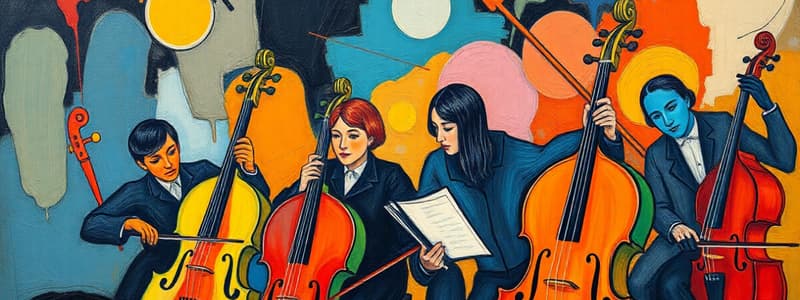Podcast
Questions and Answers
What is the typical size of a symphony orchestra?
What is the typical size of a symphony orchestra?
- 70 to 100 instrumentalists (correct)
- 120 to 150 instrumentalists
- 50 to 60 instrumentalists
- 20 to 30 instrumentalists
Which instrument can function both as a solo and orchestral instrument?
Which instrument can function both as a solo and orchestral instrument?
- Double bass
- Harp
- Violin
- Grand piano (correct)
Which of the following instruments does NOT belong to the percussion family?
Which of the following instruments does NOT belong to the percussion family?
- Tambourine
- Bass clarinet (correct)
- Triangle
- Cymbals
The development of the modern symphony orchestra can be traced back to what era?
The development of the modern symphony orchestra can be traced back to what era?
Around what time did the typical symphony orchestra reach its complete form?
Around what time did the typical symphony orchestra reach its complete form?
Flashcards
Symphony Orchestra
Symphony Orchestra
A large group of musicians, usually 70-100, playing together.
Orchestral Instruments
Orchestral Instruments
Instruments categorized into strings, woodwind, brass, and percussion.
Percussion Instruments
Percussion Instruments
Instruments producing sound through striking, shaking, or scraping.
String Instruments
String Instruments
Signup and view all the flashcards
Woodwind Instruments
Woodwind Instruments
Signup and view all the flashcards
Study Notes
Orchestra Development
- An orchestra is a large group of musicians playing together on various instruments
- The size varies from 70 to 100 instrumentalists, depending on the music
- Orchestral instruments evolved gradually since the 17th century court bands
- By 1830, a typical symphony orchestra was complete
Symphony Orchestra Composition
- Percussion: Includes instruments like the gong, bass drum, snare drum, cymbals, triangle, and tubular bells
- Brass: Includes french horns.
- Woodwind: Includes instruments like flutes, clarinets, and piccolos
- Strings: Includes violins (first and second), violas, cellos, and double basses.
- Harp
- Piano is sometimes positioned at the front of the stage for solo or concertos.
String Section
- String instruments have stretched strings that vibrate to produce sound
- String instruments vary in size from the violin to the double bass.
Studying That Suits You
Use AI to generate personalized quizzes and flashcards to suit your learning preferences.




